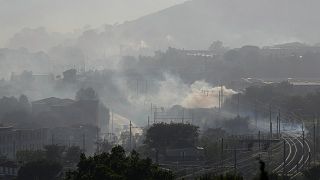Russia
It's called the "Great Swim", and for good reason.
The eight participating marathon swimmers tried to cover a distance of around 120 kilometers, passing across Russia's Lake Baikal, then along the Angara River.
Participants take in turns - relay style - without rest or sleep during the more than 30-hour challenge.
One of the most difficult things is swimming in such low temperatures, says organizer and swimmer Andrey Bugay.
"We didn't expect such a temperature, we assumed there will be warmer temperature in the Angara River than in Baikal, but it was warmer in Baikal than in Angara," he says.
"In some places in Baikal, the temperature was as high as 8.1 degrees Centigrade, while in Angara, it was 4.1 degrees."
"We didn't have time to recover, all inside is icy, nothing helps, neither sauna nor hot shower, we were shaking and shivering, then falling into the water and swimming, it was hard," he adds.
The event was organized by a local winter swimming club.
It's the third time they've tried to cross Russia's vast Lake Baikal, the world's largest freshwater lake by volume.
The first was made back in 2019, when swimmers covered 55 kilometers in wetsuits. Then in 2020, the same distance was covered without wetsuits.
This year, the task was more challenging – to cross both Lake Baikal and then the Angara River, which - to the swimmers' surprise - turned out to be colder than expected.
The race had to be stopped after about 70 kilometers.
"I was managing the protocol, and I was seeing in them that people should have made 500-700 meters within a certain time, but he was making just 240 meters, so I see that the person cannot recover," says organizer Bugay.
The swimming continued during the night, which some participants particularly enjoyed, given the views.
Jamie Monahan, a participant from the United States, doesn't blame Baikal for the unexpectedly low temperatures.
"It's very unpredictable, I guess this has never happened, but Baikal is the biggest, and deepest, and oldest lake in the world, and it does what it wants, so it gave us a good challenge," she says.
"I wish that we would have made it to the other side, but it was the best adventure with the best team that I could ever hope for, so, I have no plans yet, but I hope to come back to Baikal one day, for sure," she adds.
The harsh conditions required help from everybody, including the film crew.
"We are making a small documentary about this event, I was making all the underwater filming, but then was also accompanying the guys, we helped because it was all very complicated," says videographer Egor Lesnoy.
The swimmers started on Monday 12 July from the village of Vydrino, in the Republic of Buryatia, and ended the following day in the Russian city of Irkutsk.
The swim – aside from the excitement - was staged to draw attention to the ecology of Lake Baikal, a UNESCO World Heritage Site.
Participants reached the finish line on a boat, where they swam the last few meters and were greeted by supporters.
"We are very proud, from the swimmers to the people who helped us, from the people on the boat, we did really a great job. I am cold, and I am tired," says Italian participant Paolo Chiarino.
Swimmers came from across the world, including representatives from Russia, the United States, Italy, France, South Africa, and Morocco.
Although they didn't make it, both swimmers and organizers hope to come back and attract even more participants from other countries.
"Baikal is very special, and I will come (back) for sure," says Hassan Baraka, a participant from Morocco.
AP













02:07
Morocco explores its digital future at the 2025 Morocco Gaming Expo
Go to video
Moroccan museums open doors for free to inspire youth pride and cultural connection
01:29
Experts warn of danger of exercising in extreme heat and humidity
02:02
History made as Kirsty Coventry takes over as head of the IOC
Go to video
Women redefine Gnaoua at Essaouira Festival
01:15
Morocco says 2024 was the hottest year with temperatures reaching 47.7 degrees